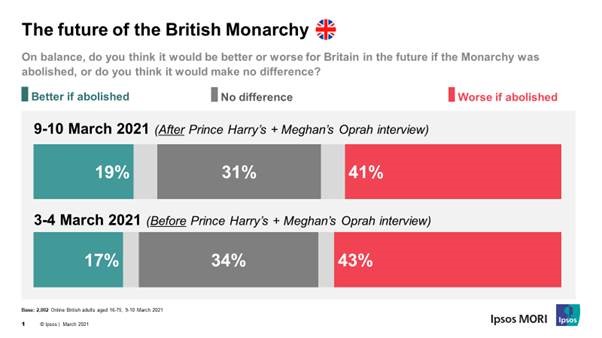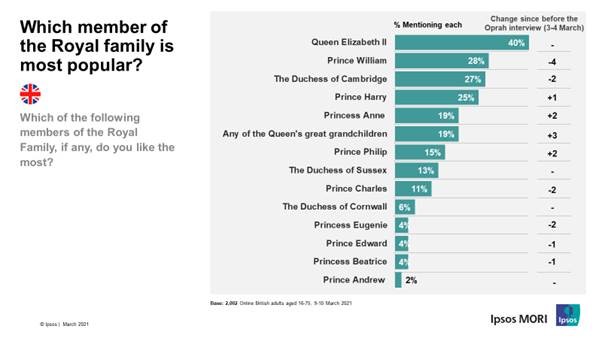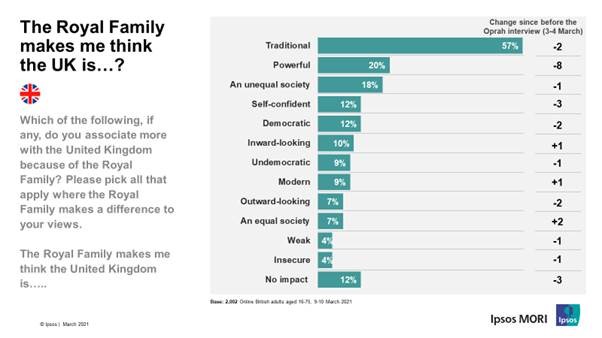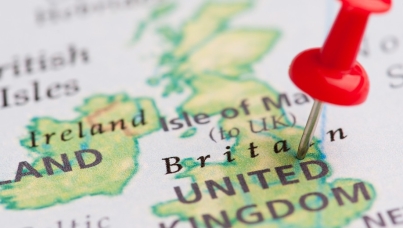Poll finds popularity of the Monarchy remains stable among Britons
Despite the conversation had by the Duke and Duchess of Sussex with Oprah Winfrey last week about their time as active Royal members, two surveys by Ipsos, completed before and after the interview, show it has done little to alter British opinions towards the monarchy.
Before the interview was aired in the UK on Monday 8th March, 43% said Britain’s future would be worse should the monarchy be abolished, and after the interview 41% said the same. Only 1 in 5 (19%) now believe abolishing the monarchy would be good for the country’s future, a similar proportion to before the interview (17%).

Opinions on individual members of the family also remain stable. Four in ten (40%) chose the Queen as one of their favourite members of the Royal Family both before and after the interview. After her, the next three are also the same; Prince William (32% chose him as one of their favourite royal family members before his brother’s conversation with Oprah, 28% selected him as a favourite after), the Duchess of Cambridge (29% before, 27% after), and Prince Harry’s popularity also remains stable, changing from 24% to 25% this week. His wife, Meghan, also remains unchanged with 13% choosing her as one of their favourites.

The Queen’s husband and daughter both see little change in their popularity, Princess Anne is now a favourite among 19% of Britons, 17% chose her before the interview, while Prince Philip is now a favourite of 15% of Britons, 13% chose him the previous week. Prince Charles also sees little change now a favourite among 11%, 13% had previously named him as their favourite.
There is also little change in how people view the UK because of the Royal Family. Before the interview, Britons were most likely to see the UK as traditional (59%), now, 57% say the same. The proportion of those who see the UK as powerful thanks to the monarchy falls by 8 percentage points to 20%.

Other associations see little change, including being an unequal society (-1), self-confident (-3), democratic (-2) and modern (+1).
In the US, opinions largely align with those in the UK. However, there are significant differences in the proportions of those who view the UK as traditional as a result of the Royal Family, 57% in the UK make this association while only 41% in the US feel the same.
Direct impact of the interview
When asked directly whether the interview had made them more or less favourable, the British media is one of those most affected. Four in ten, 42%, said it made them less favourable towards the media while only 6% said more, giving a net favourability of -38. Almost 4 in 10 (37%) say the interview has made no difference on their opinion of the British media. The British monarchy as an institution is seen less favourably as a result of the interview by 26% of Britons, while 14% view it more positively, giving it a net favourability rating of -12. Forty-two per cent say it had not changed the way they view the British monarchy as an institution.
When looking at individual members of the family, the Duchess of Sussex is affected most as a result of the interview with a 41% saying they see her less favourably while 21% see her more positively and 23% say their opinion has not changed as a result of the interview.
Similarly, for Prince Harry, a quarter (26%) say it has not changed their opinion, 34% less favourable and 24% more favourable.
Around half say the interview has not changed their views of the Queen (48%, 24% more favourable and 10% less, Prince Phillip (56% no difference, 12% more favourable 12% less), Prince Charles (47% no difference, 9% more favourable 24% less), Prince William (50% no difference, 17% more favourable 14% less), and the Duchess of Cambridge (48% no difference, 18% more favourable 17% less).
Opinions in the US also see only a minority saying the interview has changed their views, although with a different balance of opinion towards Prince Harry and the Duchess of Sussex, with more saying it has made them more favourable than less favourable (by 28% to 13% and 26% to 16% respectively).
A quarter of those in the US view the monarchy as an institution less favourably (26%, 5% more favourably), while 3 in 10 (29%) have a more negative view of the British media as a result of the interview (4% more favourably). Again though just over a third (35%) say the interview has made no difference to their opinion of the monarchy as an institution, 31% say the same about the British media.
Kelly Beaver, MD of Public Affairs at Ipsos, said:
Despite the contents of the interview and the resulting coverage and analysis in the media, the Duke and Duchess of Sussex’s interview with Oprah Winfrey appears to have done little to harm attitudes towards the monarchy here in the UK in the immediate aftermath, with Britons just as likely to worry about the role of the British media.
Technical note:
- Our first wave:
- Ipsos interviewed a representative sample of 1,065 adults aged 18-75 in Great Britain. Interviews were conducted on Ipsos’s online omnibus between 3rd and 4th March 2021. Data has been weighted to the known offline population proportions for age, working status and social grade within gender and for government office region and education. All polls are subject to a wide range of potential sources of error.
- Our second wave:
- Ipsos interviewed a representative sample of 2,002 adults aged 18-75 in Great Britain. Interviews were conducted on Ipsos’s online omnibus between 9th and 10th March 2021. Data has been weighted to the known offline population proportions for age, working status and social grade within gender and for government office region and education. All polls are subject to a wide range of potential sources of error.
- Ipsos interviewed a representative sample of 2,002 adults aged 18-75 in Great Britain. Interviews were conducted on Ipsos’s online omnibus between 9th and 10th March 2021. Data has been weighted to the known offline population proportions for age, working status and social grade within gender and for government office region and education. All polls are subject to a wide range of potential sources of error.






